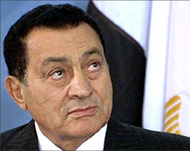Muslim Brotherhood members freed
Egyptian authorities have released seven members of the banned but tolerated Muslim Brotherhood, including a former MP and the director of a human rights group, arrested four months ago.

The state prosecutor ordered the release on bail of the men on Thursday, including former deputy Jamal Hashmat and director of the Alexandria centre of human rights Ali Abd al-Fatah.
The seven men were arrested at Hashmat’s home in the northern town of Damanhur on 8 September.
The Brotherhood was founded in 1928 by Egyptian Hasan al-Banna and spread to other Arab countries. It calls for the establishment of an Islamic state by peaceful means.
Currently in control of Egypt’s doctors and lawyers respective associations, the Brotherhood exists as religious charitable and educational institution, but it is not permitted to stand as a political party in national elections.
Elections in November 2000 saw Muslim Brotherhood members win 16 seats in the 454-member parliament, making it the main opposition force in Egypt.
But Muslim Brotherhood members have to run as independent candidates because of the ban on the Brotherhood’s political activities.
|
“Egypt is suffering from intellectual poverty in political and economic policy.” Walid Kazziha, |
‘Humble beginnings’
Abd al-Munaim Said, director of the al-Ahram Centre, says the Muslim Brotherhood has come a long way since its humble beginnings.
“They are a political movement that has a vision of how the country should be run. They have a traditional message, but they use modern techniques to spread that message,” he told Aljazeera.net.
According to Said, the Brotherhood is an ideological organisation with members who have a “naïve understanding of politics because they are only concerned with religious convictions”.
“They have no input on social, economic, or educational matters in Egypt,” he said.
Little opposition
But Professor Walid Kazziha from the American University in Cairo says the Muslim Brotherhood thrives because there are few other voices of opposition.
 |
|
President Hosni Mubarak has been |
“Egypt is suffering from intellectual poverty in political and economic policy. All intellectual trends are weak, especially the government’s policies. Secular intellectuals are not providing any more articulate views on political issues than religious groups,” Kazziha said.
To avoid retaliation from authorities, the Brotherhood focuses its efforts on non-government organisations. This allows it to penetrate mass organisations quietly, says Kazzhia.
Doing otherwise has proven deadly. In November 2003, Muslim Brotherhood member Saad Sayyid Muhammad Qutb, 43, was reportedly tortured to death while in custody.
The Egyptian Human Rights Organisation said Qutb sustained several different injuries around his body.
The Brotherhood’s supreme guide, Maamun al-Hodaibi, called the death “monstrous and unacceptable”.
Human Rights Watch says torture and ill treatment of political opponents is common in Egypt.